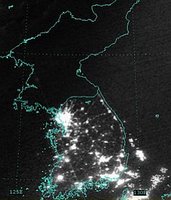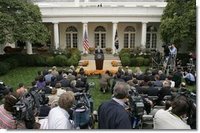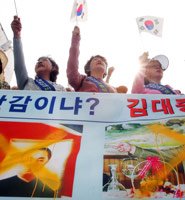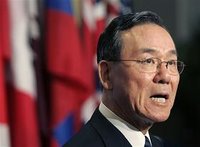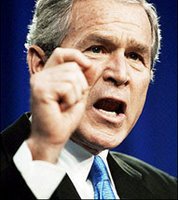UN Security Council Resolution 1718 (2006)
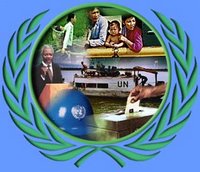 The Meat and Potatoes of UN Resolution 1718
The Meat and Potatoes of UN Resolution 1718The sanctions againt the People's Republic of Korea (North Korea)
Article added on October 15 and updated on October 16, 2006:
8. Decides that:
(a) all Member States shall prevent the direct or indirect supply, sale or transfer to the DPRK, through their territories or by their nationals, or using their flag vessels or aircraft, and whether or not originating in their territories, of:
(i) any battle tanks, armoured combat vehicles, large calibre artillery systems, combat aircraft, attack helicopters, warships, missiles or missile systems as defined for the purpose of the United Nations Register on Conventional Arms, or related materiel including spare parts, or items as determined by the Security Council or the Committee established by paragraph 12 below (the Committee);
(ii) all items, materials, equipment, goods and technology as set out in the lists in documents S/2006/814 and S/2006/815, unless within 14 days of adoption of this resolution the Committee has amended or completed their provisions also taking into account the list in document S/2006/816, as well as other items, materials, equipment, goods and technology, determined by the Security Council or the Committee, which could contribute to DPRK’s nuclear-related, ballistic missile-related or other weapons of mass destruction-related programmes;
(iii)luxury goods;
(b) the DPRK shall cease the export of all items covered in subparagraphs (a) (i) and (a) (ii) above and that all Member States shall prohibit the procurement of such items from the DPRK by their nationals, or using their flagged vessels or aircraft, and whether or not originating in the territory of the DPRK;
(c) all Member States shall prevent any transfers to the DPRK by their nationals or from their territories, or from the DPRK by its nationals or from its territory, of technical training, advice, services or assistance related to the provision, manufacture, maintenance or use of the items in subparagraphs (a) (i) and (a) (ii) above;
(d) all Member States shall, in accordance with their respective legal processes, freeze immediately the funds, other financial assets and economic resources which are on their territories at the date of the adoption of this resolution or at any time thereafter, that are owned or controlled, directly or indirectly, by the persons or entities designated by the Committee or by the Security Council as being engaged in or providing support for, including through other illicit means, DPRK’s nuclear-related, other weapons of mass destruction-related and ballistic missile-related programmes, or by persons or entities acting on their behalf or at their direction, and ensure that any funds, financial assets or economic resources are prevented from being made available by their nationals or by any persons or entities within their territories, to or for the benefit of such persons or entities;
(e) all Member States shall take the necessary steps to prevent the entry into or transit through their territories of the persons designated by the Committee or by the Security Council as being responsible for, including through supporting or promoting, DPRK policies in relation to the DPRK’s nuclear-related, ballistic missile-related and other weapons of mass destruction-related programmes, together with their family members, provided that nothing in this paragraph shall oblige a state to refuse its own nationals entry into its territory;
(f) in order to ensure compliance with the requirements of this paragraph, and thereby preventing illicit trafficking in nuclear, chemical or biological weapons, their means of delivery and related materials, all Member States are called upon to take, in accordance with their national authorities and legislation, and consistent with international law, cooperative action including through inspection of cargo to and from the DPRK, as necessary;
“9. Decides that the provisions of paragraph 8 (d) above do not apply to financial or other assets or resources that have been determined by relevant States:
(a) to be necessary for basic expenses, including payment for foodstuffs, rent or mortgage, medicines and medical treatment, taxes, insurance premiums, and public utility charges, or exclusively for payment of reasonable professional fees and reimbursement of incurred expenses associated with the provision of legal services, or fees or service charges, in accordance with national laws, for routine holding or maintenance of frozen funds, other financial assets and economic resources, after notification by the relevant States to the Committee of the intention to authorize, where appropriate, access to such funds, other financial assets and economic resources and in the absence of a negative decision by the Committee within five working days of such notification;
(b) to be necessary for extraordinary expenses, provided that such determination has been notified by the relevant States to the Committee and has been approved by the Committee; or
(c) to be subject of a judicial, administrative or arbitral lien or judgement, in which case the funds, other financial assets and economic resources may be used to satisfy that lien or judgement provided that the lien or judgement was entered prior to the date of the present resolution, is not for the benefit of a person referred to in paragraph 8 (d) above or an individual or entity identified by the Security Council or the Committee, and has been notified by the relevant States to the Committee;
“10. Decides that the measures imposed by paragraph 8 (e) above shall not apply where the Committee determines on a case-by-case basis that such travel is justified on the grounds of humanitarian need, including religious obligations, or where the Committee concludes that an exemption would otherwise further the objectives of the present resolution;
“11. Calls upon all Member States to report to the Security Council within thirty days of the adoption of this resolution on the steps they have taken with a view to implementing effectively the provisions of paragraph 8 above;
....
